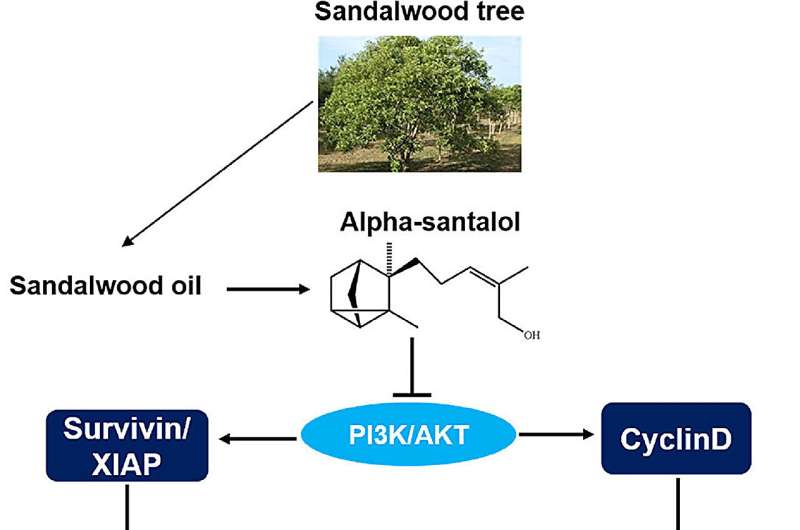This article has been reviewed according to Science X's editorial process and policies. Editors have highlighted the following attributes while ensuring the content's credibility:
fact-checked
trusted source
proofread
Sandalwood oil by-product found to prevent prostate cancer development in mice

Extracted from the core of sandalwood trees (santalum album tree), sandalwood oil has been used for many centuries by several cultures throughout the world for perfume, soaps, incense, and candles. With its earthy, sweet scent, this essential oil is also used in the food industry and topically in various cosmetic preparations.
Importantly, this natural oil is known for its health benefits and medicinal applications, from antibacterial to anticancer, because of its phytochemical constituents. In addition to containing esters, free acids, aldehydes, ketones, and santenone, sandalwood oil primarily (90 percent or more) constitutes santalol—equal amounts of two compounds, alpha and beta-santalol.
Now, researchers from Florida Atlantic University's Schmidt College of Medicine and collaborators are the first to demonstrate in vivo the chemo-preventive properties of alpha-santalol against prostate cancer development using a transgenic mouse model.
Results of the study, published in the journal Phytomedicine Plus, showed that administration of alpha-santalol decreased the incidence of prostate tumors by decreasing cell proliferation and inducing apoptosis, without causing weight loss or any noticeable side effects. Apoptosis, or programmed cell death, is a method the body uses to get rid of unneeded or abnormal cells such as cancer cells.
Findings revealed that the area occupied by normal tissue in alpha-santalol-treated mice was 53 percent compared to 12 percent in control mice.
This suggests that administering alpha-santalol protected the normal tissue and delayed progression from prostatic intraepithelial neoplasia, a precancerous condition, to poorly differentiated carcinoma, a high-grade form of cancer where cancer cells and tissue look very abnormal. These results are significant because mortality in prostate cancer patients is mainly attributable to advanced stages of the disease.
In prior studies, the researchers demonstrated the efficacy of alpha-santalol in suppressing growth and inducing apoptotic cell death in cultured human prostate cancer cells. Based on these observations, they selected a genetically engineered mouse model that resembles many features similar to human prostate cancer, eliciting different lesion grades and cancer progression.
"Although our cellular studies provided important mechanistic insights, relevant in vivo models are vital for developing novel chemo-preventive agents for clinical use and to determine if alpha-santalol offers protection against prostate cancer development," said Ajay Bommareddy, Ph.D., senior author and an associate professor of pharmacology in the Department of Biomedical Science, FAU Schmidt College of Medicine. "Prior to this new study, alpha-santalol's in vivo efficacy against prostate cancer development had not yet been established."
Additional findings of the current study showed that alpha-santalol reduced the incidence of visible prostate tumors compared to control-treated mice. Only 11 percent in the treated group developed prostate tumors, whereas more than half in the control group developed the tumors.
The differences in urogenital and prostate weights were statistically significantly different in alpha-santalol-treated mice compared with controls. The average wet weight of the urogenital tract in alpha-santalol-treated mice was about 74.28 percent lower compared with control mice. Similarly, the average wet weight of the prostate gland was lower by 52.9 percent compared with control mice.
Prostate cancer is the second leading cause of cancer death in men in the United States. An estimated 288,300 new cases were diagnosed in American men last year, with about 34,700 estimated deaths.
Current treatment methods for prostate cancer include androgen ablation, chemotherapy, radiotherapy and radical prostatectomy, but are ineffective against advanced prostate cancers. Early detection and local therapy have resulted in improved outcomes but has been challenging with the management of advanced stages.
"Identifying agents that have the ability to selectively target cancerous cells and delay onset and progression of prostate cancer is greatly needed," said Bommareddy. "Additional studies are essential to systemically explore the feasibility of alpha-santalol as a promising chemo-preventive and anti-tumor agent against human prostate cancer development and to elucidate the mechanisms surrounding the role of pro-apoptotic and antiapoptotic proteins."
More information: Ajay Bommareddy et al, Alpha-santalol, a derivative of sandalwood oil prevents development of prostate cancer in TRAMP mice, Phytomedicine Plus (2024). DOI: 10.1016/j.phyplu.2024.100523





















